Didactic Reading Materials
Our didactic lecture series incorporates Request for Proposal (RFP) Projects, journal clubs, clinical site tours, guest speakers, and hands-on experience. Additionally, the didactic lectures include literature to serve as a conductor for thought-provoking discussions as well as a reference point or tool for long term professional development. Below is a sample list of some of the textbooks we utilize throughout the year.
Health Disparities in the United States: Social Class, Race, Ethnicity, and the Social Determinants of Health Third Edition
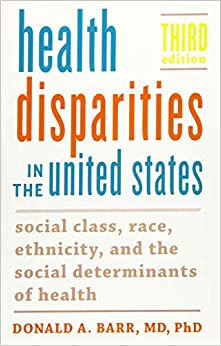 The health care system in the United States has been called the best in the world. Yet wide disparities persist between social groups, and many Americans suffer from poorer health than people in other developed countries. In this revised edition of Health Disparities in the United States, Donald A. Barr provides extensive new data about the ways low socioeconomic status, race, and ethnicity interact to create and perpetuate these health disparities. Examining the significance of this gulf for the medical community and society at large, Barr offers potential policy- and physician-based solutions for reducing health inequity in the long term. This thoroughly updated edition focuses on a new challenge the United States last experienced more than half a century ago: successive years of declining life expectancy. Barr addresses the causes of this decline, including what is commonly referred to as "deaths of despair"―from an opiate overdose or suicide. Exploring the growing role geography plays in health disparities, Barr asks why people living in rural areas suffer the greatest increases in these deaths. He also analyzes recent changes under the Affordable Care Act and considers the literature on how race and ethnicity affect the way health care providers evaluate and treat patients. As both a physician and a sociologist, Barr is uniquely positioned to offer rigorous medical explanations alongside sociological analysis. An essential text for courses in public health, health policy, and sociology, this compelling book is a vital teaching tool and a comprehensive reference for social science and medical professionals.
The health care system in the United States has been called the best in the world. Yet wide disparities persist between social groups, and many Americans suffer from poorer health than people in other developed countries. In this revised edition of Health Disparities in the United States, Donald A. Barr provides extensive new data about the ways low socioeconomic status, race, and ethnicity interact to create and perpetuate these health disparities. Examining the significance of this gulf for the medical community and society at large, Barr offers potential policy- and physician-based solutions for reducing health inequity in the long term. This thoroughly updated edition focuses on a new challenge the United States last experienced more than half a century ago: successive years of declining life expectancy. Barr addresses the causes of this decline, including what is commonly referred to as "deaths of despair"―from an opiate overdose or suicide. Exploring the growing role geography plays in health disparities, Barr asks why people living in rural areas suffer the greatest increases in these deaths. He also analyzes recent changes under the Affordable Care Act and considers the literature on how race and ethnicity affect the way health care providers evaluate and treat patients. As both a physician and a sociologist, Barr is uniquely positioned to offer rigorous medical explanations alongside sociological analysis. An essential text for courses in public health, health policy, and sociology, this compelling book is a vital teaching tool and a comprehensive reference for social science and medical professionals.
Preventive Medical Care in Psychiatry: A Practical Guide for Clinicians First Edition
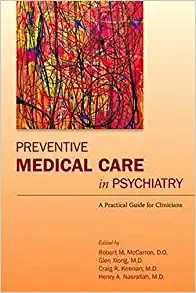 Preventive Medical Care in Psychiatry: A Practical Guide for Clinicians is designed to assist psychiatrists and other mental health providers in making the shift from treating mental disorders to treating the holistic needs of people with mental disorders. Individuals with chronic mental illness typically have higher rates of adverse health risk behaviors, such as smoking, poor diet, and lack of physical activity, which puts them at high risk for the development of obesity, type 2 diabetes, and cardiovascular disease. Additionally, these individuals frequently lack a primary care physician. By focusing on the knowledge and skills mental health providers need to prevent and detect common medical conditions in their patients, the book enables them to develop models of care that are integrated within individuals and across populations. Written by experts in the field-many with dual training in psychiatry and medicine - the book focuses on clinical care that is within the scope of psychiatrists and other mental health care providers who work in outpatient mental health and integrated clinics. These clinicians will find Preventive Medical Care in Psychiatry: A Practical Guide for Clinicians to be an eminently useful, evidence-based guide to offering holistic care and improving their patients' health.
Preventive Medical Care in Psychiatry: A Practical Guide for Clinicians is designed to assist psychiatrists and other mental health providers in making the shift from treating mental disorders to treating the holistic needs of people with mental disorders. Individuals with chronic mental illness typically have higher rates of adverse health risk behaviors, such as smoking, poor diet, and lack of physical activity, which puts them at high risk for the development of obesity, type 2 diabetes, and cardiovascular disease. Additionally, these individuals frequently lack a primary care physician. By focusing on the knowledge and skills mental health providers need to prevent and detect common medical conditions in their patients, the book enables them to develop models of care that are integrated within individuals and across populations. Written by experts in the field-many with dual training in psychiatry and medicine - the book focuses on clinical care that is within the scope of psychiatrists and other mental health care providers who work in outpatient mental health and integrated clinics. These clinicians will find Preventive Medical Care in Psychiatry: A Practical Guide for Clinicians to be an eminently useful, evidence-based guide to offering holistic care and improving their patients' health.
HBR's 10 Must Reads on Emotional Intelligence (with featured article "What Makes a Leader?") by Daniel Goleman
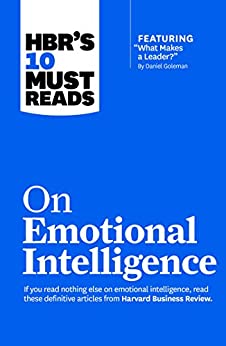 In his defining work on emotional intelligence, bestselling author Daniel Goleman found that it is twice as important as other competencies in determining outstanding leadership. If you read nothing else on emotional intelligence, read these 10 articles by experts in the field. We've combed through hundreds of articles in the Harvard Business Review archive and selected the most important ones to help you boost your emotional skills-and your professional success. This book will inspire you to monitor and channel your moods and emotions, make smart, empathetic people decisions, manage conflict and regulate emotions within your team, react to tough situations with resilience, better understand your strengths, weaknesses, needs, values, and goals, and develop emotional agility.
In his defining work on emotional intelligence, bestselling author Daniel Goleman found that it is twice as important as other competencies in determining outstanding leadership. If you read nothing else on emotional intelligence, read these 10 articles by experts in the field. We've combed through hundreds of articles in the Harvard Business Review archive and selected the most important ones to help you boost your emotional skills-and your professional success. This book will inspire you to monitor and channel your moods and emotions, make smart, empathetic people decisions, manage conflict and regulate emotions within your team, react to tough situations with resilience, better understand your strengths, weaknesses, needs, values, and goals, and develop emotional agility.
Understanding Health Policy: A Clinical Approach, Eighth Edition
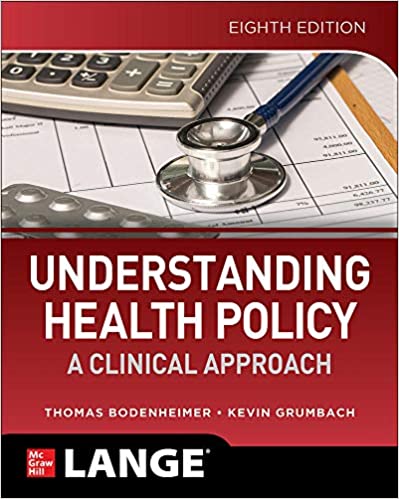 Understanding Health Policy: A Clinical Approach provides everything you need to master the healthcare system's nuances and complexities, work more effectively with other members of healthcare teams, and identify areas in need of change. Written by practicing primary care physicians who are experts in healthcare policy, this peerless guide covers the entire scope of the U.S. healthcare system and draws on lessons from systems in other nations. The authors carefully weave key principles, descriptions, and concrete examples into chapters that make vital health policy issues interesting and understandable. Whether you're a student, medical practitioner, or public policy professional, you will come away with a clearer, more systematic way of thinking about our healthcare system, its biggest challenges, and the most effective ways of making it better for everyone.
Understanding Health Policy: A Clinical Approach provides everything you need to master the healthcare system's nuances and complexities, work more effectively with other members of healthcare teams, and identify areas in need of change. Written by practicing primary care physicians who are experts in healthcare policy, this peerless guide covers the entire scope of the U.S. healthcare system and draws on lessons from systems in other nations. The authors carefully weave key principles, descriptions, and concrete examples into chapters that make vital health policy issues interesting and understandable. Whether you're a student, medical practitioner, or public policy professional, you will come away with a clearer, more systematic way of thinking about our healthcare system, its biggest challenges, and the most effective ways of making it better for everyone.
"Classics of Community Psychiatry: Fifty Years of Public Mental Health Outside the Hospital" by Michael Rowe, Martha Lawless, Kenneth Thompson, and Larry Davidson
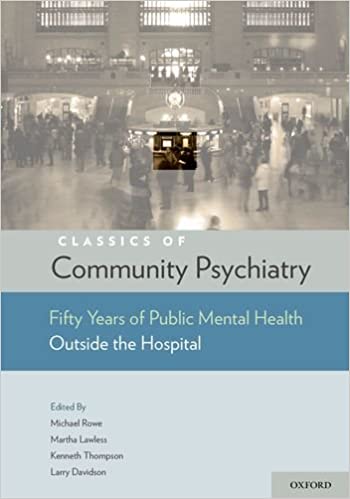 Classics in Community Psychiatry is the first volume to examine the course of the community psychiatry movement over the past fifty years. Starting with deinstitutionalization, the editors chart the progress and setbacks of the movement by presenting carefully selected primary source material from the realms of academia, politics, and even literature. For example, a classic journal article explores the relationship between social class and mental health, while excerpts from government documents describe mental health legislation. A novel demonstrates social attitudes toward the mentally ill, while a report from a federally funded task force discusses homelessness and severe mental illness. Each selection pinpoints a specific issue and moment of time during the history of mental health services over the past five decades and is accompanied by insightful commentary from the volume's editors. The result is a unique, innovatively conceived book that incorporates many different viewpoints to illustrate the evolution of community psychiatry, as well as the need to devote more resources and planning to mental health services looking ahead. Classic in Community Psychiatry will be a valuable resource for mental health professionals, including psychiatrists, psychologists, social workers, administrators, and policymakers, and for graduate and undergraduate students in community psychology and psychiatry.
Classics in Community Psychiatry is the first volume to examine the course of the community psychiatry movement over the past fifty years. Starting with deinstitutionalization, the editors chart the progress and setbacks of the movement by presenting carefully selected primary source material from the realms of academia, politics, and even literature. For example, a classic journal article explores the relationship between social class and mental health, while excerpts from government documents describe mental health legislation. A novel demonstrates social attitudes toward the mentally ill, while a report from a federally funded task force discusses homelessness and severe mental illness. Each selection pinpoints a specific issue and moment of time during the history of mental health services over the past five decades and is accompanied by insightful commentary from the volume's editors. The result is a unique, innovatively conceived book that incorporates many different viewpoints to illustrate the evolution of community psychiatry, as well as the need to devote more resources and planning to mental health services looking ahead. Classic in Community Psychiatry will be a valuable resource for mental health professionals, including psychiatrists, psychologists, social workers, administrators, and policymakers, and for graduate and undergraduate students in community psychology and psychiatry.
"Handbook of Community Psychiatry" by Hunter McQuistion, Wesley Sowers, Jules Ranz and Jacqueline Maus Feldman
 During the past decade or more, there has been a rapid evolution of mental health services and treatment technologies, shifting psychiatric epidemiology, changes in public behavioral health policy, and increased understanding in medicine regarding approaches to clinical work that focus on patient-centeredness. These contemporary issues need to be articulated in a comprehensive format. The American Association of Community Psychiatrists (AACP), a professional organization internationally recognized as holding the greatest concentration of expertise in the field, has launched a methodical process to create a competency certification in community psychiatry. As a reference for a certification examination, that effort will benefit enormously from a comprehensive handbook on the subject.
During the past decade or more, there has been a rapid evolution of mental health services and treatment technologies, shifting psychiatric epidemiology, changes in public behavioral health policy, and increased understanding in medicine regarding approaches to clinical work that focus on patient-centeredness. These contemporary issues need to be articulated in a comprehensive format. The American Association of Community Psychiatrists (AACP), a professional organization internationally recognized as holding the greatest concentration of expertise in the field, has launched a methodical process to create a competency certification in community psychiatry. As a reference for a certification examination, that effort will benefit enormously from a comprehensive handbook on the subject.
"Public Mental Health" by William W. Eaton
 Public Mental Health equips a new generation of public health students, researchers, and practitioners with the most innovative social. biological, and behavioral science approaches to mental health challenges at the population level. Incorporating insights from multiple health and science disciplines, this new edition introduces novel concepts and methodologies for understanding the occurrence of mental disorders in populations worldwide. Reflecting the disciplinary diversity and expertise of an internationally-recognized roster of contributors, its nineteen chapters include coverage of such essential topics as estimates of global prevalence based on new data from the Global Burden of Disease Study, the complex way in which genes, other biological factors, and life stresses increase risk, mental health disparities among population subgroups, population-level mental health consequences of violence and natural disasters, and the logic and practice of prevention of mental and behavioral disorders
Public Mental Health equips a new generation of public health students, researchers, and practitioners with the most innovative social. biological, and behavioral science approaches to mental health challenges at the population level. Incorporating insights from multiple health and science disciplines, this new edition introduces novel concepts and methodologies for understanding the occurrence of mental disorders in populations worldwide. Reflecting the disciplinary diversity and expertise of an internationally-recognized roster of contributors, its nineteen chapters include coverage of such essential topics as estimates of global prevalence based on new data from the Global Burden of Disease Study, the complex way in which genes, other biological factors, and life stresses increase risk, mental health disparities among population subgroups, population-level mental health consequences of violence and natural disasters, and the logic and practice of prevention of mental and behavioral disorders
